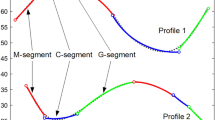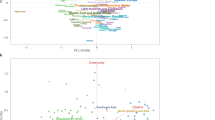Abstract
THE problem of specifying an individual as a member of one of many populations, and the classification of a number of populations themselves in some significant system based on the configuration of various characteristics, are of great importance in anthropological and biological research. We may find a collection of skulls with unspecified sexes, and the problem faced by an anthropologist is assigning proper sex to a skull. Judgment based on mere anatomical appreciation of a skull may not be altogether wrong, but is subject to criticism especially when objective methods are available. This problem has been solved by Fisher's discriminant function. If we have a collection of skulls grouped according to specified populations, the problem is to arrive at constellations of populations such that any two members of a constellation are closer to one another than any two belonging to different constellations. This problem can be solved by Mahalanobis's generalized distance.
This is a preview of subscription content, access via your institution
Access options
Subscribe to this journal
Receive 51 print issues and online access
$199.00 per year
only $3.90 per issue
Buy this article
- Purchase on Springer Link
- Instant access to full article PDF
Prices may be subject to local taxes which are calculated during checkout
Similar content being viewed by others
Author information
Authors and Affiliations
Rights and permissions
About this article
Cite this article
RAO, C. The Problem of Classification and Distance Between Two Populations. Nature 159, 30–31 (1947). https://doi.org/10.1038/159030b0
Issue Date:
DOI: https://doi.org/10.1038/159030b0
This article is cited by
-
Comparing the inertial effect of MEWMA and multivariate sliding window schemes with confidence control charts
The International Journal of Advanced Manufacturing Technology (2015)
-
Bayes Neutral Zone Classifiers With Applications to Nonparametric Unsupervised Settings
Journal of Agricultural, Biological, and Environmental Statistics (2013)
-
Konfidenzintervalle für den überlappenden Teil zweier Normalverteilungen
Metrika (1962)
Comments
By submitting a comment you agree to abide by our Terms and Community Guidelines. If you find something abusive or that does not comply with our terms or guidelines please flag it as inappropriate.



